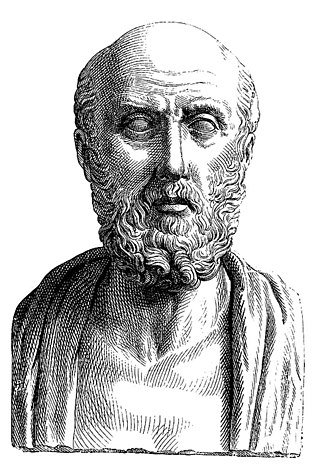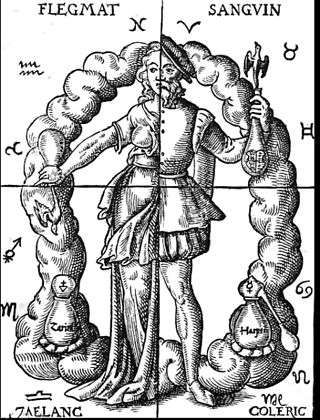
Hippocrates of Kos, also known as Hippocrates II, was a Greek physician of the classical period who is considered one of the most outstanding figures in the history of medicine. He is traditionally referred to as the "Father of Medicine" in recognition of his lasting contributions to the field, such as the use of prognosis and clinical observation, the systematic categorization of diseases, or the formulation of humoral theory. The Hippocratic school of medicine revolutionized ancient Greek medicine, establishing it as a discipline distinct from other fields with which it had traditionally been associated, thus establishing medicine as a profession.

The Hippocratic Oath is an oath of ethics historically taken by physicians. It is one of the most widely known of Greek medical texts. In its original form, it requires a new physician to swear, by a number of healing gods, to uphold specific ethical standards. The oath is the earliest expression of medical ethics in the Western world, establishing several principles of medical ethics which remain of paramount significance today. These include the principles of medical confidentiality and non-maleficence. As the seminal articulation of certain principles that continue to guide and inform medical practice, the ancient text is of more than historic and symbolic value. It is enshrined in the legal statutes of various jurisdictions, such that violations of the oath may carry criminal or other liability beyond the oath's symbolic nature.
The Declaration of Geneva was adopted by the General Assembly of the World Medical Association at Geneva in 1948, amended in 1968, 1983, 1994, editorially revised in 2005 and 2006 and amended in 2017.
Primum non nocere is a Latin phrase that means "first, do no harm". The phrase is sometimes recorded as primum nil nocere.

Humorism, the humoral theory, or humoralism, was a system of medicine detailing a supposed makeup and workings of the human body, adopted by Ancient Greek and Roman physicians and philosophers.

The Hippocratic Corpus, or Hippocratic Collection, is a collection of around 60 early Ancient Greek medical works strongly associated with the physician Hippocrates and his teachings. The Hippocratic Corpus covers many diverse aspects of medicine, from Hippocrates' medical theories to what he devised to be ethical means of medical practice, to addressing various illnesses. Even though it is considered a singular corpus that represents Hippocratic medicine, they vary in content, age, style, methods, and views practiced; therefore, authorship is largely unknown. Hippocrates began Western society's development of medicine, through a delicate blending of the art of healing and scientific observations. What Hippocrates was sharing from within his collection of works was not only how to identify symptoms of disease and proper diagnostic practices, but more essentially, he was alluding to his personable form of art, "The art of true living and the art of fine medicine combined." The Hippocratic Corpus became the foundation upon which Western medical practice was built.
Abu al-Hasan Ahmad ibn Muhammad al-Tabari, born in Amol, was a 10th-century Persian physician from Tabaristan. He was the physician of Rukn al-Dawla, a Buyid ruler.
"Hippocratic Oath" is the 76th episode of the syndicated American science fiction television series Star Trek: Deep Space Nine. It is the third episode of the fourth season and is directed by castmember René Auberjonois.
John Beamish Dossetor, was a Canadian physician and bioethicist who is notable for co–coordinating the first kidney transplant in Canada and the Commonwealth.

Helen King is a British classical scholar and advocate for the medical humanities. She is Professor Emerita of Classical Studies at the Open University. She was previously Professor of the History of Classical Medicine and Head of the Department of Classics at the University of Reading.
Ludwig Edelstein was a classical scholar and historian of medicine.
Louis Cesare Lasagna was an American physician and professor of medicine, known for his revision of the Hippocratic Oath.
Steven H. Miles is an American doctor, author, and professor of medicine who has published on ethically topics relating to medicine and the use of torture.
A Hippocratic Oath for scientists is an oath similar to the Hippocratic Oath for medical professionals, adapted for scientists. Multiple varieties of such an oath have been proposed. Joseph Rotblat has suggested that an oath would help make new scientists aware of their social and moral responsibilities; opponents, however, have pointed to the "very serious risks for the scientific community" posed by an oath, particularly the possibility that it might be used to shut down certain avenues of research, such as stem cells.

M.D. was a short lived comic book published by EC Comics in 1955, the sixth title in its New Direction line. The bi-monthly comic was published by Bill Gaines and edited by Al Feldstein. It lasted a total of five issues before being cancelled along with EC's other New Direction comics.
Karen D. Davis is a neuroscience professor at the University of Toronto, and is the head of Division of Brain, Imaging & Behaviour, Krembil Research Institute at the University Health Network. Davis was inducted into the Johns Hopkins Society of Scholars in 2009, the Canadian Academy of Health Sciences in 2018 and the Royal Society of Canada in 2020 and is currently the president of the Canadian Pain Society.
Spyros Marketos was a Greek physician, professor of medicine, writer and politician.
Asaph the Jew, also known as Asaph ben Berechiah and Asaph the Physician is a figure mentioned in the ancient Jewish medical text the Sefer Refuot. Thought by some to have been a Byzantine Jew and the earliest known Hebrew medical writer, he is however a rather uncertain figure who some have suggested is identifiable with the legendary mystical vizier Asif ibn Barkhiya of Arabian folklore, associated with King Solomon. Scholars in favor of Asaph’s historicity suggest that he might have lived somewhere between the 3rd and 7th Centuries CE, possibly in Byzantine Palaestina or Mesopotamia. However, the text itself from which Asaph is known seems to place him between Hippocrates and Pedanius Dioscorides, which if chronological would imply that he might have been thought to have been between the 5th Century BCE and 1st Century CE, though this is very uncertain. The Sefer Refuot, the only known historical Jewish text to mention Asaph, is the earliest known Hebrew medical work, and thus of great historical significance. The "Oath of Asaph" found in the text resembles the Hippocratic Oath and was taken by medical students at their graduation.
The Osteopathic Oath is an oath commonly administered to osteopathic physicians who practice osteopathic medicine in the United States. Similar to the Hippocratic Oath, it is a statement of professional values and ethics. The first version of the oath was created in 1938, and the current version of the oath has been in use since 1954. Although taking the oath is not required or legally binding, it is commonly seen as a rite of passage.
Charaka shapath is a certain passage of text in Charaka Samhita, a Sanskrit text on Ayurveda believed to have been composed between 100 BCE and 200 CE. The passage referred to as Charaka Shapath is written in the form a set of instructions by a teacher to prospective students of the science of medicine. According to Charaka Samhita, the unconditional agreement to abide by these instructions is a necessary precondition to be eligible to be taught in the science of medicine. The passage gives explicit instructions on the necessity of practicing asceticism during student life, student-teacher relationship, the importance of committing oneself fully and completely for the well-being of the patient, whom to treat, how to behave with women, and several other related issues. The passage appears as paragraphs 13–14 in Chapter 8 of the Vimanasthana in Charaka Samhita.



